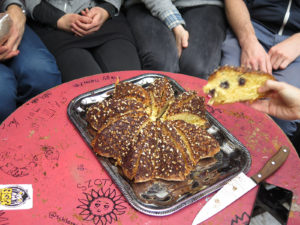In October 2017, during a conference in Berlin aimed to find new solutions to Europe’s housing crisis, several groups from Central and South Eastern Europe met and discovered that they had many things in common while starting their own community-led, cooperative housing projects.
In January 2018, a meeting was set in Ljubljana, Slovenia. The groups started to wonder how to work together as the financial and institutional barriers in neighbouring countries are very similar, and to build a strong network providing support to overcome those challenges.
The meeting turned out to be very successful and groups have been working together since. Either online or in different workshops, there has been a constant support and a will to strengthen the network with the collaboration of each member.
There have been four large workshops to date, and each of them has helped the network not only to acquire a name – MOBA (coming from “self-build through mutual help” in South Slavic languages) – but to altogether give the network a well-defined structure and a vision.
Along 2018, MOBA has been officially set as a network aiming to be a point of reference for those who are willing to start a community-led, cooperative project in Central and South Eastern Europe, an area where housing ownership is the most common practice (despite its inaccessible prices).
The different workshops have also been a platform to share experiences with initiatives from other countries in Europe, such as the Community Land Trust Brussels (Belgium) or Lilac (UK). Having people sharing their successes when starting their projects has been an inspiration for MOBA. This reflects one of the features of the network, which plans to connect people from different backgrounds, who can work together in the development of CLH. MOBA is a ‘’pool of expertise’’, where diverse skills, experiences and initiatives are reunited in a network accessible to everyone.
Since the beginning, MOBA has been characterised by the strong commitment of their members and “not losing time’’ attitude. Work has been distributed regularly and when workshops weren’t feasible to do, smaller groups had been set with the objective of working in different important aspects of the network, such as: securing financial support, meetings to discuss funding opportunities, organisation of the network, consideration of business plans and finance setup of each of the hubs or how to access funds.
During this year, many achievements have been accomplished, among others: Zadrugator (Ljubljana) won tender to lease public land from local authority and 50% of necessary sum from the national housing fund, Rákóczi Collective (Budapest) had their first tenants moving in, formal registration of Housing Cooperative Pametnija Zgrada (Belgrade), support of various financial and international organisations (including World Habitat, FundAction, Heinrich Böll Foundation), development of project portfolios, design of website and logo for MOBA, among others.
Each organisation is at a very different stage of their project, where some of them have already bought a house or land, and others still fighting with the rigid institutions. This has been a positive feature of the network, where mutual support is granted, the success of each group is celebrated, and lessons learned are exchanged.
MOBA has high expectations, for example: working towards offering a vast database, where all the ongoing and finished projects will be registered, facilitating the identification of actors, objectives and giving details about their structure and functioning. It will also inform about the financial resources, funds or grants available to community-led, cooperative housing projects, helping people to identify where and how to apply for funds, another big challenge in the current panorama.
Although MOBA doesn’t have it easy, for reasons beyond its control, is moving fast towards becoming a point of reference in the region. The network’s ambition is to connect all of us, people, interested in seeing community-led, cooperative housing spread as a model, responding to social and housing needs. Despite the challenges faced, if we take into account the progress achieved during its first anniversary, the potential of the network speaks by itself.
by Lorena De Ferra (World Habitat)

